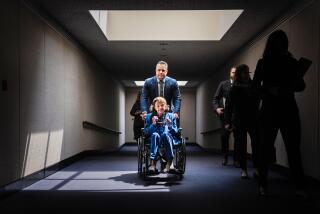First Lady Ends Her Rounds on Capitol Hill
- Share via
WASHINGTON — First Lady Hillary Rodham Clinton, in the last of five appearances before congressional committees this week, encountered pointed questions Thursday about the financing of the White House health care proposal--including a call for a “reality check” from the chairman of the Senate Finance Committee.
Chairman Daniel Patrick Moynihan (D-N.Y.) was openly skeptical of the Administration’s claim that its plan could reduce the growth in health care costs--now rising twice as fast as most other prices--to no greater than the rate of inflation by the year 2000.
Noting that President Clinton had promised “a continuing reality check” on the plan, Moynihan asked of the promise to rein in health care costs: “How would that survive a reality check. . . ? What are we to say? Are we really thinking zero growth in cost?”
The First Lady stood fast behind the forecast. “We believe--and I don’t think you can find any health economist or student of the health care system who would disagree--that there are considerable, substantial savings in the existing system that can be realized both on a one-time-only basis and on a continuing basis,” she said, citing estimates that the $1-trillion health care system may include more than $200 billion in waste.
Her appearance before the Finance Committee marked the final round of a grueling three-day schedule during which she delivered 12 hours of testimony before three House committees and two Senate panels.
While the tone of the Finance Committee questioning was as friendly and complimentary as it had been with the other four panels, the detail demanded by the senators suggested that they intend to give the entire plan what could be the most intensive economic scrutiny that it will get on Capitol Hill.
“We have to talk as honestly as we can to the American people--no rosy scenarios, no smoke and mirrors, no juggling the books,” said Senate Minority Leader Bob Dole (R-Kan.), a member of the committee. “Whatever plan is adopted will require some Americans to sacrifice. These sacrifices must be explained clearly.”
Sen. Bob Packwood (R-Ore.), the panel’s ranking Republican, expressed doubts about the Administration’s estimate that government financing of health care benefits for early retirees would cost $4.5 billion annually.
“How do you get there? How do you know?” he asked.
“We have done the best we can at estimating it, and I’ll be happy to lay out all of the estimating that has gone on based on the figures that are available to us,” the First Lady said. But she conceded: “I don’t know that anyone can tell you how precise that is to what percentage or decimal point.”
Sen. John B. Breaux (D-La.) expressed concern about the plan’s proposal to put caps on the growth in health care premiums if increased competition does not rein them in sufficiently within two years. “Twenty-four months is not nearly enough time to allow the competition to work,” he said.
The First Lady, however, described the caps as “budgetary discipline” needed to give health care providers incentives to change wasteful practices.
More to Read
Get the L.A. Times Politics newsletter
Deeply reported insights into legislation, politics and policy from Sacramento, Washington and beyond. In your inbox twice per week.
You may occasionally receive promotional content from the Los Angeles Times.










